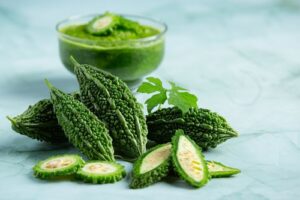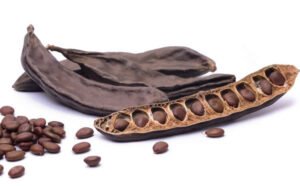Bitter leaf, scientifically called Vernonia amygdalina, is one of the most popular herbs in Africa.
Native Africans have used it for centuries to treat various ailments.
Today, it’s still used as a known herbal remedy to treat digestive issues, bleeding, malaria, and other health issues.
This article reviews the benefits, uses, and side effects of bitter leaf.
What is bitter leaf
Bitter leaf is a small plant with dark leaves and rough bark belonging to the Asteraceae family.
They’re native to tropical Africa but are predominantly grown in West Africa where they grow rapidly on most types of soils.
The leaves are very bitter, hence its name. And are fondly called Onugbu, Ewuro (Nigeria), Awonwono (Ghana), Omubirizi (Uganda), Ndoleh (Cameroon), Ebichaa (Ethiopia), and Umubilizi (Rwanda).
All the plant’s parts including the leaves, stems, and roots are used in herbal remedies.
The leaves contain a variety of bioactive compounds, such as phenolic compounds, flavonoids, alkaloids, saponins, sesquiterpene lactones, and many more.
And studies have found that these compounds are responsible for bitter leaf’s impressive health benefits. [1]
Potential health benefits of bitter leaf
The medicinal benefits of the bitter leaf (Vernonia amygdalina) include:
Antioxidant properties
The bitter leaf plant is rich in plant compounds that function as antioxidants.
Antioxidants defend your cells against oxidative stress and help prevent metabolic disorders like diabetes, cancer, and coronary heart disease.
Some of these antioxidants are flavonoids, phenolic acids, and sesquiterpenes. They act by scavenging free radicals, detoxifying, and inhibiting stress response proteins. [2]
Malaria
Malaria is a disease caused by the plasmodium parasite and is transmitted to humans by the bite of an infected mosquito.
Studies have found bitter leaf to be a cheap and effective treatment for malaria.
One animal study found that bitter leaf extract exhibited significant antiplasmodial activity against Plasmodium berghei – a species of the malaria parasite. [3]
Another study found that active compounds (sesquiterpene lactones) in bitter leaf showed significant activity against Plasmodium falciparum. [4]
However, more human studies are needed to determine the exact mechanism of action.
Parasitic infestations
Bitter leaves have been in use in traditional African medicine to treat worm infestations.
And recent studies in chimpanzees and gorillas have backed-up these claims.
One Tanzanian study found that worm-infested chimpanzees were cured completely of their symptoms (stomach pain, diarrhea) after eating bitter leaves. [5]
Microbial infections
In ancient African medicine bitter leaf has been used to treat bacterial and fungal infections.
One test-tube study found that the aqueous extract of bitter leaf inhibited the growth of the S.aureus and E.coli – two infectious bacteria. [6]
Another study found that bitter leaf extract lowered the growth of fungi and bacteria in palm wine – reducing the risk of spoilage. [7]
Although these studies have found activity against microbial infections, more human studies are still required.
Diabetes management
High blood sugar is the most common symptom of diabetes and other chronic conditions.
Several studies have found that antioxidants and fiber found in bitter leaf plant may help lower sugar levels.
One study found a 21.4% decrease in blood glucose levels of diabetic rats that were administered with bitter leaf extract after 14 days. [8]
Another animal study discovered that bitter leaves significantly lowered fasting blood sugar, total cholesterol, triglyceride, and LDL-Cholesterol after fourteen days of administration. [9]
Still, human-based research on the effects of bitter leaves on blood sugar is lacking.
Cancer prevention
Cancer is a disease that involves the uncontrolled growth of cells.
Several studies have reported that antioxidants found in bitter leaves could help destroy free radicals that cause cancer.
One test-tube study reported that bitter leaf extracts inhibited the growth of cancerous cells found on the nasopharynx. The study also discovered two compounds (vernomygdin and vernodalin) that showed anti-cancer effects. [10]
In another test-tube study, extract from bitter leaf suppressed the growth of breast tumor cells. [11]
However, human studies are needed before making any recommendations.
Digestive health
The rich dietary fiber content of bitter leaves helps in digestion and prevents constipation.
Fruits and vegetables rich in dietary fiber are recommended for everyone.
Also, fiber and antioxidant-rich foods aid digestive regularity and protect digestive health.
Breast milk enhancer

In some parts of Nigeria, the dried powdered leaves are given orally to nursing mothers to promote milk production.
Alternatively, the fresh leaves are washed thoroughly to remove bitterness and used to prepare a type of beef soup called “Ofe Onugbu”.
This soup or drink is believed to enhance breast milk production and increase milk flow. Although recent animal studies have found similar activity. More human studies are required. [12]
Other uses of bitter leaf (Vernonia amygdalina)
The following are traditional uses of bitter leaf:
- Oxytocic effect: In Malawi, the leaves are used to induce labor and control postpartum bleeding. And recent animal studies have justified this use. [12]
- Wound treatment: In traditional African medicine, fresh bitter leaves are crushed, and the fresh juice is used to treat cuts, bruises, or boils. It’s believed to stop bleeding and prevent infection.
- Weight loss: Bitter leaves are rich in fiber and may help promote weight loss. One study found that bitter leaf extract lowered total cholesterol and triglyceride levels in the blood. [8]
- Beer production: Due to its rich antioxidant content and bitter taste, the leaves are often used as a hop substitute in beer production. Also, it is also used to prevent microbial contamination of beer products. [13]
Possible side effects

Bitter leaf (Vernonia amygdalina) extracts have no known side effects on humans or animals and are considered safe.
However, scientific evidence advises that bitter leaves should not be consumed in high amounts – because, at high doses, it becomes toxic and poisonous to human cells.
Also, it is important to note that the roots contain toxic chemicals that may cause poisoning and should be ingested in minimal amounts after proper cleansing.
The bottom line
Bitter leaf (Vernonia amygdalina) is incredibly useful and has shown activity against malaria, cancer, diabetes, parasites, and heart disease. However human-based research is still limited.
Although it is considered safe in normal dosage, always remember to reduce the bitterness by washing thoroughly if you are adding it to your diet.
And if you are using the crude leaves remember not to go overboard with it.
Finally, there aren’t many vegetables or herbs like bitter leaves. So it’s worth trying it out!
13 Sources
- Oyeyemi I. et al. (2017). Vernonia amygdalina: A folkloric herb with anthelmintic properties. Beni-Suef University Journal of Basic and Applied Sciences. 7. 10.1016/j.bjbas.2017.07.007.
- Farombi, E. O., & Owoeye, O. (2011). Antioxidative and chemopreventive properties of Vernonia amygdalina and Garcinia biflavonoid. International journal of environmental research and public health, 8(6), 2533–2555. https://doi.org/10.3390/ijerph8062533
- Anoka A. et al. (2008) Journal of Medicinal Food. 574-581.http://doi.org/10.1089/jmf.2007.051
- Egharevba, Clement. et al. (2014). Significance of Bitter Leaf (Vernonia Amagdalina) In Tropical Diseases and Beyond: A Review. 10.4172/2090-2778.1000120.
- Huffman. et al. (2012). Further observations on the use of the medicinal plant, Vernonia amygdalina(Del) by a wild chimpanzee, its possible effect on parasite load, and its phytochemistry. African Study Monographs, 14, 227-240.
- Oboh F. et al. (2009). Nutritional and Antimicrobial Properties of Vernonia amygdalina leaves. African Studies on Population and Health.
- G.M. Gberikon et al. (2016). Effect of Bitter Leaf Extract (Vernonia amygdalina) on Culturable Microorganisms Isolated from Palm Wine in Makurdi Metropolis. Research Journal of Microbiology, 11: 112-118.
- Atangwho, Item J et al.(2013) “Antioxidant versus anti-diabetic properties of leaves from Vernonia amygdalina Del. growing in Malaysia.” Food chemistry vol. : 3428-34.
- Ogbuagu, E. et al (2019). Effect of Methanolic Extract of Vernonia amygdalina Leaves on Glycemic and Lipidaemic Indexes of Wistar Rats. Asian Journal of Research in Medical and Pharmaceutical Sciences, 7(3), 1-14. https://doi.org/10.9734/ajrimps/2019/v7i33012
- Kupchan, S M et al. (1969) “Tumor inhibitors. XLVII. Vernodalin and vernomygdin, two new cytotoxic sesquiterpene lactones from Vernonia amygdalina Del.” The Journal of organic chemistry vol. 34,12: 3908-11. doi:10.1021/jo01264a035
- Izevbigie EB. et al. (2004) A novel natural inhibitor of extracellular signal-regulated kinases and human breast cancer cell growth. Exp Biol Med (Maywood). 229(2):163-169. doi:10.1177/153537020422900205
- Ijeh II, Igwe KK, Ejike CECC (2010). Effect of leaf aqueous extracts of Vernonia amygdalina Del. on the contraction of mammary gland and uterus of guinea pig dams. J. Herbs Spices Med. Plants 16: in press.
- Adama, .(2011). Bitter Leaf as Local Substitute for Hops in the Nigerian Brewing Industry. Scholars Research Library.3(4):388–397.
Get new free and exclusive health tips delivered straight to your inbox!



